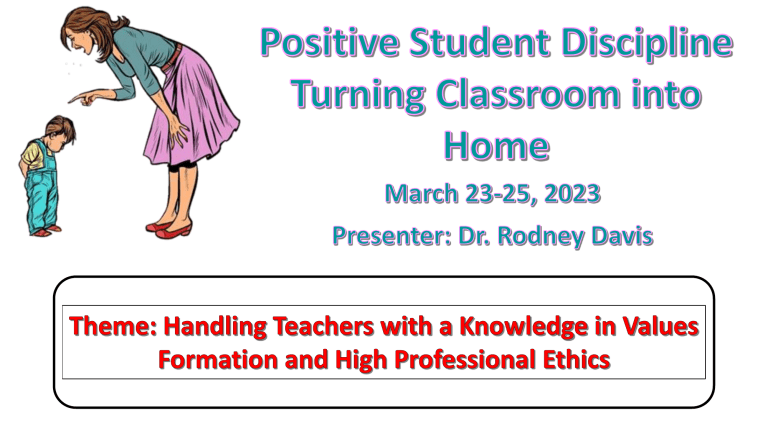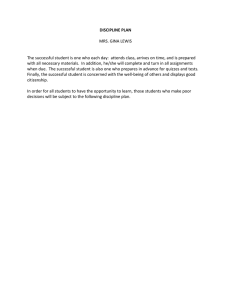Positive Student Discipline: Turning Classroom into Home
advertisement

Is this realistic? On school property One or more times in the last 12 months Or injured by a weapon, gun, knife, or club Missed at least 1 day in previous 30 days because they felt unsafe going to or while at school *2019 Survey of High School Students Therefore Therefore Therefore Therefore Effective Communication Mutual Respect • Adults model firmness by self-respect and needs of situation. • Adults model kindness by respecting the needs of the child Identify the Belief Behind the Behavior • Recognize the reasons by kids do what they do • Change the beliefs rather than change behavior Discipline that Teaches • Not Punitive • Not Permissive • Focuses on solutions Encouragement not Praise • Effort & Improvement • Builds long-term self• Esteem empowerment Effective Problem Solving • • • • • • Goal is conformity to a set of rules You need not understand the rules Rules do not need to make sense Submit to authority Obey without question Do not think for yourself • • • • • • Goal is socially acceptable behavior Understanding of rules critical Rules guide student behavior Rules promote consistency Learning environment predictable Rules are the safety net Teaching the Social and Life Skills necessary for developing young people into contributing members of a community. By Examples of Skills 1. Self-respect 2. Respect for others 3. Concern for others 4. Problem-solving 5. Accountability 6. Contribution to society 7. Cooperation/collaboration They have the discipline data and have authority to set discipline policy must support in order to be successful Begins With A Partnership Parents must know what is expected, have a voice in creating policy. Students know what is expected Teachers and staff will implement and therefore must know what to do as well as help to create the policy Bad behavior does not just happen in schools. It spills out into the community. These leaders have an interest in what happens in school and should be part of the process Strategy Meetings What kinds of behavior problems are we having? Who is doing it? When is it taking place? (Before/After school? Between Classes?) Where is it taking place on campus? Have other schools had the same problems? What did they do about them? Were they successful? Develop the Plan • • • • • • Review and Revise the Rules-with student involvement Improve classroom management-provide training if needed Look for new ways to engage students in learning Choose evidence based programs Involve community to support school & students Engage parents as valued partners in the process • Promote new program • Inform all stakeholders • Set up information meetings • • • • Develop the Plan Teachers need training on new program Provide professional development on classroom management Parents/students will also need training Make sure everyone has the implementation timeline • Promotional materials • Signs etc. • Allow enough time to complete training and promotional activities • Follow the implementation plan and schedule • Revise as needed Implement the Plan • • • • No implementation goes perfectly Be available to handle problems Be positive and reassure those with concerns Be quick to respond • Did you accomplish what you set out to do? • Gather data and analyze • Boredom source of many problems • Training on student engagement • Active participation in learning • Have only a few • Allow for discretion • Cover several misbehaviors • Save suspensions for most serious safety issues • Teachers feel inadequate • Training on respect for teacher • Look for proven programs • Difference between working harder and smarter • Look for community programs that can help address underlying social problems • Family members need to be involved in meaningful ways as real partners • Maintain your work ethic and always do your best. (High School) • We complete our work on time and always do the very best we can. (Middle School) • We always do our best. (Elementary School) • Completing all work • Positive attitude even when work is hard • Being organized • No cheating on homework or tests • Working on good behavior • Participating in class activities • • • • • Create a positive learning climate Safe Respectful Welcoming Supportive of student learning • Teacher and students are partners in the learning process • Teacher’s attitude critical to establishing a positive climate • Teacher needs to remain positive at all times. • Teacher provides ample amounts of inspiration and encouragement


